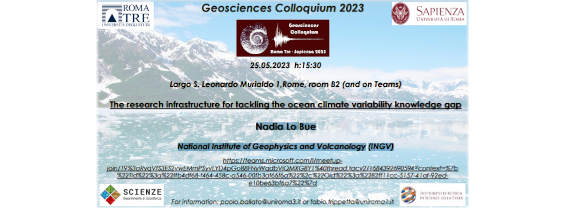Seminario della dott.ssa Nadia Lo Bue (INGV) giovedì 25 maggio 2023, ore 15.30, su Teams

Nell'ambito dei Geosciences Colloquium, la dott.ssa Nadia Lo Bue (INGV) terrà un seminario dal titolo "The research infrastructure for tackling the ocean climate variability knowledge gap", giovedì 25 maggio 2023 alle ore 15.30 su Teams .
Link Teams: https://teams.microsoft.com/
ABSTRACT:
To understand the most effective strategy to tackle a vast and global problem such as climate change, it is first necessary to think about the type of processes and mechanisms governing the climate engine. The complexity of such a system lies in the many different stochastic interactions that can occur between all the (open) components of the climate. Understanding the mechanisms that govern these interactions is mandatory for assessing climate variability and is essential for increasing awareness and responsibility of the scientific community. This implies that direct knowledge must be improved both in terms of spatial distribution, especially for areas that are still under-explored, and over time, as well as being shareable and interoperable to support multidisciplinary research.
Due to their high thermal capacity, the oceans are one of the most impactful climatic components for evaluating the global heat content. Although the technology of the last 50 years has allowed us to achieve very important goals in the field of global observation (both in situ and by remote sensing) by allowing continuous and very high-resolution monitoring of the Ocean Heat Content(OHC), this has interested only the upper layers of the water column (700m) neglecting the deep layers almost entirely. It is quite known that deep oceans act as big storage of energy. In terms of OHC, the progressive heat released from deep layers can act as positive feedback inducing further warming of the sub-superficial layers and influencing the ability of the ocean to retain and transform CO2. In terms of climate variability, this process sensibly affects the ocean system and could contribute to accelerating the global rising trends (e.g. temperature, pH)producing, in turn, positive feedback in CO2 content in the atmosphere.
The EMSO Research Infrastructure, with its regional facilities distributed at key marine sites around Europe offers multidisciplinary long-term monitoring of the whole water column including deep layers, contributing to filling the knowledge gaps on deep dynamics whose impacts are still largely underestimated in the study of climate variability. RIs such as EMSO contribute to improving the development of new technology, sharing expertise, opportunity, and resources. Being provider of deep original data, RIs such as EMSO can also play a crucial role in starting a critical and constructive dialogue with the modeler community to understand how can be assimilated the deep data into the models in order to produce most precise estimations on the impact that the energy of the deep layers can give to climate variability.

